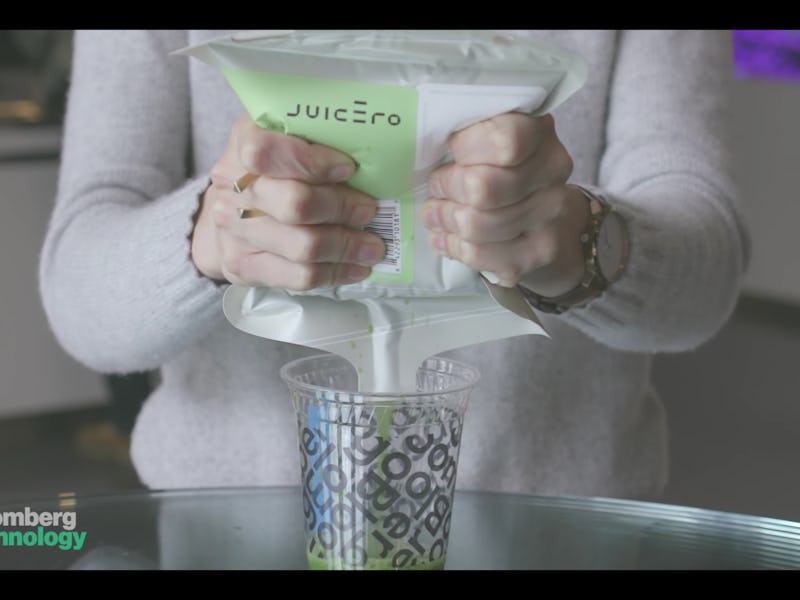Juicero's CEO Pleads With Users Not to "Hack" $400 IOT Juicer
Why does juice need to connect to the internet anyway?

This past week, Bloomberg reporters made a not-so-startling discovery about the internet-connected Juicero juicer: It’s even more unnecessary than previously thought. The machine, sold by a San Francisco-based tech company of the same name, uses pre-packaged bags of chopped fruits and veggies, which it then squeezes with a supposed four tons of force to extract the tasty, tasty juice within. In a video posted to the Bloomberg Technology website last week, reporters got pretty much the exact same amount of juice out of a Juicero bag by just squeezing it with their hands as they did by putting it into the internet-connected counter-space-hog.
It’s pretty much the most low-tech hack in history.
Juicero has raised over $120 million from investors for the device that basically does the same thing as a stack of books: squeezes one thing between two heavy things. It initially retailed for $700 but now costs just $399. Still, it’s hardly a steal. And given that it’s yet another device that makes us reliant on the company’s proprietary pre-packaged single-use pods — I’m looking at you, Keurig — the Juicero begs the world to question its existence.
Now, to be fair, the company’s concept of delivering pre-packaged fruit and veggie packs to Juicero customers is pretty nice, especially for anyone who’s ever performed the seriously tedious and messy task of cleaning a juicer. In this way, the Juicero really does seem attractive, since it promises zero clean-up.
But the recent revelation raises a couple serious questions: Why pay for the expensive machine when you can do the same thing with your hands, and if you can get the same amount of juice out of a pack just by squeezing it, then what is the machine even doing?
Fear not, because Juicero’s CEO, Jeff Dunn, is here to answer your concerns. Kind of.
Dunn posted a response on Medium soon after the video surfaced. He cites his experience at Coca-Cola — though it’s not clear how that qualifies him as a health food expert now — and essentially begs customers not to squeeze the juice bags because the company worked really hard on the system.
The sum of the system — the Press, Produce Packs and App — working together is what enables a great experience. However, you won’t experience that value by hand-squeezing Produce Packs, which to be clear, contain nothing but fresh, raw, organic chopped produce, not juice. What you will get with hand-squeezed hacks is a mediocre (and maybe very messy) experience that you won’t want to repeat once, let alone every day.
This response comes off as pretty condescending, especially since it doesn’t really address the concerns of customers or investors who may be wondering, “What the hell am I paying for?”
Commentators jumped on how out-of-touch Juicero’s makers must have been to think people would heed their cautions about not squeezing the bags.
Dunn actually has three points to help convince customers that they’re getting the value they’re paying for:
First, the Press. Our connected Press itself is critical to delivering a consistent, high quality and food safe product because it provides:
1. The first closed loop food safety system that allows us to remotely disable Produce Packs if there is, for example, a spinach recall. In these scenarios, we’re able to protect our consumers in real-time.
2. Consistent pressing of our Produce Packs calibrated by flavor to deliver the best combination of taste and nutrition every time.
3. Connected data so we can manage a very tight supply chain, because our product is live, raw produce, and has a limited lifespan of about 8 days.
But just like other Internet of Things devices, the Juicero takes a product that didn’t need to be connected to the internet and adds a whole new way for it to fail. Naturally, critics jumped on this, especially in light of Friday’s power outages.
Critics also pointed out that, in light of the recent revelation, the Juicero is yet another product that puts a machine between us and our, uhh, manual labor.
And did we mention it’s really expensive?
The whole situation feels like a sitcom, leading some commentators to question whether it’s an elaborate hoax, teasing the Season 4 Premiere of Silicon Valley.
Check out the Bloomberg video here: